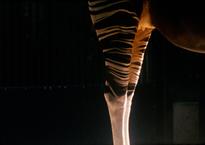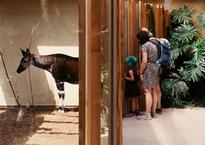UBUNDU
Jelena Jureša’s Ubundu, a film poem filmed at Antwerp Zoo, portrays the okapi, an animal exhibited for the first time in Antwerp in 1919 (the nine-month-old animal was an instant sensation, but within a month it grew weaker and eventually died). The animal has been mentioned in the writings of Henry Morton Stanley in 1890, and has been known for a long time as the African unicorn, or as an elusive okapi. Okapi can be found only in Congo region, and in zoos all over the world. Due to habitat loss, poaching, and frequent human conflict, the okapi have suffered and are classified as endangered. The portrait of the animal that can only breed in captivity outside of the DRC, is juxtaposed with the voiceover acting out, shouting and singing the wounds of displacement and non-belonging.
The work is inspired by the writings of W.G. Sebald, a German author who offered an alternative model of memory through intertextuality and a metonymical narrative technique. In his most notable novels, Austerlitz and The Rings of Saturn, he circumnavigates the sites of radicalised violence, tracing the line between the Holocaust and colonialism. He comments on the “Ugliness of Belgium” as a result of spreading amnesia and the participation of all Belgians in Congolese riches. Antwerp Zoo and the European railway system have an important place in Sebald’s writing: the expansion of the railways enabled the development of capitalist production and transnational transport, becoming the symbol of their age, whilst also enabling mass deportations and genocide.
Because of her intention to incorporate Sebald's phrase about the “Ugliness of Belgium” in her new work, Jureša has been declined official permission to film the okapi at Antwerp Zoo.


- Format DIGITAL FILE(DIGITAL FILE)
- Color system PAL
- Color col.
- Year 2019
- Duration 00:17:45
- Languageinfo
Running text/titles: English UK
Spoken: Dutch/ Flemish, English UK
-
Artists